This Week in Freethought History (April 15-21)
(The following is a transcript of a LIVE broadcast by John Mill, the radio persona of Ronald Bruce Meyer. “This Week In Freethought” airs on the American Heathen® internet radio show. Air date of this particular segment: 04/21/12)
Here’s your Week in Freethought History: This is more than just a calendar of events or mini-biographies – it’s an affirmation that we as freethinkers are neither unique nor alone in the world, no matter how isolated and alone we may feel at times.
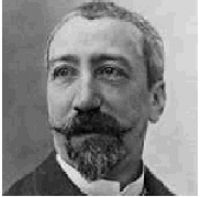 Last Monday, April 16, was the 168th birthday of French writer, critic and Nobel Laureate Anatole France (1844). The writer began as a journalist and married a mentor wealthy enough to get him noticed by 1881. All of France’s novels were unabashedly pagan, in addition to lampooning clerics and Christianity. In the 1920s his writings were put on the Index of Prohibited Books. It was Anatole France who said, “The law, in its majestic equality, forbids the rich as well as the poor to sleep under bridges, to beg in the streets, and to steal bread.” And also (perhaps thinking of religious belief), “If fifty million people say a foolish thing, it is still a foolish thing.”
Last Monday, April 16, was the 168th birthday of French writer, critic and Nobel Laureate Anatole France (1844). The writer began as a journalist and married a mentor wealthy enough to get him noticed by 1881. All of France’s novels were unabashedly pagan, in addition to lampooning clerics and Christianity. In the 1920s his writings were put on the Index of Prohibited Books. It was Anatole France who said, “The law, in its majestic equality, forbids the rich as well as the poor to sleep under bridges, to beg in the streets, and to steal bread.” And also (perhaps thinking of religious belief), “If fifty million people say a foolish thing, it is still a foolish thing.”
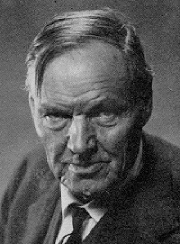 It was 155 years ago last Wednesday, April 18, that American trial lawyer Clarence Darrow was born (1857). Darrow was 67 years old when he came in direct contact with the conflict between religion and reason in defending Tennessee science teacher John T. Scopes for teaching the theory of evolution rather than fables of gods, snakes and apples. Scopes was convicted, but the world read of and listened (on a scientific novelty called radio) to the famous 1925 “Monkey T rial,” A tireless fighter for the rights of the powerless against the powerful, Darrow once said, “I don’t believe in God because I don’t believe in Mother Goose.”
It was 155 years ago last Wednesday, April 18, that American trial lawyer Clarence Darrow was born (1857). Darrow was 67 years old when he came in direct contact with the conflict between religion and reason in defending Tennessee science teacher John T. Scopes for teaching the theory of evolution rather than fables of gods, snakes and apples. Scopes was convicted, but the world read of and listened (on a scientific novelty called radio) to the famous 1925 “Monkey T rial,” A tireless fighter for the rights of the powerless against the powerful, Darrow once said, “I don’t believe in God because I don’t believe in Mother Goose.”
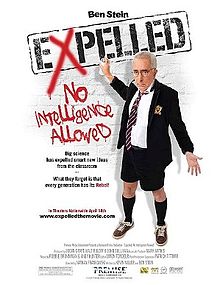 Coincidentally, or not, it was on April 18, 2008, that the documentary film Expelled: No Intelligence Allowed was released in the United States. You can read more about this in my “Reflection” on that film.
Coincidentally, or not, it was on April 18, 2008, that the documentary film Expelled: No Intelligence Allowed was released in the United States. You can read more about this in my “Reflection” on that film.
Two more anniversaries were marked last Thursday, April 19—
 It was on April 19, 1993, that federal government forces with tanks, gas and guns invaded the Branch Davidian compound in Waco, Texas. During the 51-day Waco Siege, “Ranch Apocalypse” was burned to the ground and 76 Davidians, twenty of them children, along with their 33-year-old leader, David Koresh, died. The confrontation between the male-dominated, gun-toting government officials and the male-dominated, gun-toting Davidians began on Sunday, February 28. Waco stands today as a massive breach of civil rights and an abuse of government power against a relatively harmless Christian sect. If it can happen to minority Christians, in this nation of churchgoers, are atheists safe?
It was on April 19, 1993, that federal government forces with tanks, gas and guns invaded the Branch Davidian compound in Waco, Texas. During the 51-day Waco Siege, “Ranch Apocalypse” was burned to the ground and 76 Davidians, twenty of them children, along with their 33-year-old leader, David Koresh, died. The confrontation between the male-dominated, gun-toting government officials and the male-dominated, gun-toting Davidians began on Sunday, February 28. Waco stands today as a massive breach of civil rights and an abuse of government power against a relatively harmless Christian sect. If it can happen to minority Christians, in this nation of churchgoers, are atheists safe?
 The Waco Siege inspired Timothy McVeigh and Terry Nichols, two years later to the day, to perpetrate the most destructive act of terrorism on American soil until the September 11, 2001 attacks – the Oklahoma City Bombing (1995).
The Waco Siege inspired Timothy McVeigh and Terry Nichols, two years later to the day, to perpetrate the most destructive act of terrorism on American soil until the September 11, 2001 attacks – the Oklahoma City Bombing (1995).
Last Friday, April 20, brings us two more connected anniversaries—
 Last Friday was the 123rd birthday of German Nazi leader Adolf Hitler (1889). While in jail for treason in Germany – he had been plotting to overthrow the Weimar Republic by force – Hitler began dictating Mein Kampf (My Struggle). Hitler’s Catholic upbringing, coupled with a disbelief that a Jew could really be a German (much like George H.W. Bush’s disbelief that an atheist could really be an American), informed his writing. “I believe that I am acting in accordance with the will of the Almighty Creator,” wrote Hitler. He was clearly no atheist. The only major complaints from Rome regarded Hitler’s interference in Church matters, which were largely silenced by a 1933 Concordat with the Vatican. And Hitler could not have been successful without the support of German Catholics.
Last Friday was the 123rd birthday of German Nazi leader Adolf Hitler (1889). While in jail for treason in Germany – he had been plotting to overthrow the Weimar Republic by force – Hitler began dictating Mein Kampf (My Struggle). Hitler’s Catholic upbringing, coupled with a disbelief that a Jew could really be a German (much like George H.W. Bush’s disbelief that an atheist could really be an American), informed his writing. “I believe that I am acting in accordance with the will of the Almighty Creator,” wrote Hitler. He was clearly no atheist. The only major complaints from Rome regarded Hitler’s interference in Church matters, which were largely silenced by a 1933 Concordat with the Vatican. And Hitler could not have been successful without the support of German Catholics.
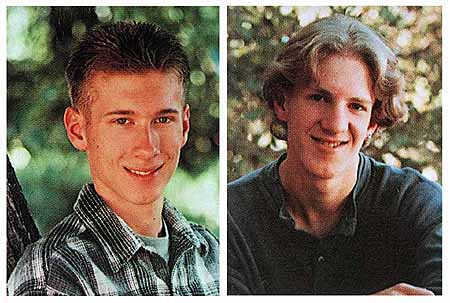 It was also last Friday, April 20, 13 years ago, that two students at Columbine High School in Littleton, Colorado, brought guns and explosives instead of textbooks to school (1999). The bullied and belittled students had planned their massacre for over a month and timed it for Adolph Hitler’s birthday. Perhaps like Hitler, after their rampage, which left 12 students and a teacher dead, Dylan Klebold and Eric Harris took their own lives.
It was also last Friday, April 20, 13 years ago, that two students at Columbine High School in Littleton, Colorado, brought guns and explosives instead of textbooks to school (1999). The bullied and belittled students had planned their massacre for over a month and timed it for Adolph Hitler’s birthday. Perhaps like Hitler, after their rampage, which left 12 students and a teacher dead, Dylan Klebold and Eric Harris took their own lives.
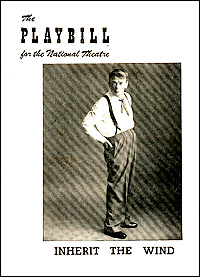 We keep returning to this theme, but it was 56 years ago today that Inherit the Wind, a play by Jerome Lawrence and Robert E. Lee dramatizing the famous Scopes “Monkey Trial” of the summer of 1925, opened at the National Theatre on Broadway (1955). Inherit the Wind was not about a clash between two 1920s pop stars, Clarence Darrow vs. William Jennings Bryan, or a clash of cultures, intellectual vs. religious. The playwrights are really focused on defending freedom of thought in a time of anti-communist hysteria: The 1950s were a time of cultural anxiety and anti-intellectualism in the U.S., inspired by the crusade of Sen. Joseph McCarthy and his colleagues on the House Un-American Activities Committee. So Drummond (the Darrow character) says to the jury, “Yes there is something holy to me! The power of the individual human mind. An idea is a greater monument than a cathedral. And the advance of man’s knowledge is more of a miracle than any sticks turned to snakes, or the parting of waters. ... Gentlemen, progress has never been a bargain. You’ve got to pay for it. ... Darwin moved us forward to a hilltop, where we could look back and see the way from which we came. But for this view, this insight, this knowledge, we must abandon our faith in the pleasant poetry of Genesis.”
We keep returning to this theme, but it was 56 years ago today that Inherit the Wind, a play by Jerome Lawrence and Robert E. Lee dramatizing the famous Scopes “Monkey Trial” of the summer of 1925, opened at the National Theatre on Broadway (1955). Inherit the Wind was not about a clash between two 1920s pop stars, Clarence Darrow vs. William Jennings Bryan, or a clash of cultures, intellectual vs. religious. The playwrights are really focused on defending freedom of thought in a time of anti-communist hysteria: The 1950s were a time of cultural anxiety and anti-intellectualism in the U.S., inspired by the crusade of Sen. Joseph McCarthy and his colleagues on the House Un-American Activities Committee. So Drummond (the Darrow character) says to the jury, “Yes there is something holy to me! The power of the individual human mind. An idea is a greater monument than a cathedral. And the advance of man’s knowledge is more of a miracle than any sticks turned to snakes, or the parting of waters. ... Gentlemen, progress has never been a bargain. You’ve got to pay for it. ... Darwin moved us forward to a hilltop, where we could look back and see the way from which we came. But for this view, this insight, this knowledge, we must abandon our faith in the pleasant poetry of Genesis.”
We can look back, but the Golden Age of Freethought is now. You can find full versions of these pages in Freethought history at the links in this blog posting.

